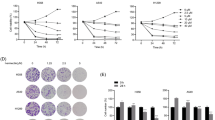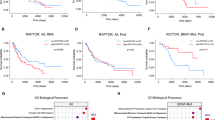Abstract
Background
Autophagy can function in a dual role in cancer development and progression: It can be cytoprotective or contribute to cell death. Therefore, determining the contextual role of autophagy between these two opposing effects is important. So far, little is known about the role of autophagy in uveal melanoma. In the present study, we looked to investigate the autophagic process, as well as its effect on cell survival in uveal melanoma cell lines under stressed conditions (starvation). The possible role of autophagy during BRAF inhibition in uveal melanoma was also sought.
Methods
Two human uveal melanoma cell lines, OCM1A, which harbors the BRAF mutation V600E and Mel 290, which is BRAF wild type, were studied. Autophagy levels were determined by Western blot assay with/without the addition of autophagic flux inhibitor (bafilomycin A1). Cell proliferation was assessed by an MTT assay.
Results
Starvation triggered autophagy in BRAF V600E-mutant OCM1A cells but not in BRAF wild-type Mel 290 cells. Enhanced autophagy helped the OCM1A cells survive under stressed conditions. The BRAF inhibitor vemurafenib upregulated autophagy through suppression of the PI3K/Akt/mTOR/p70S6 K pathway in BRAF V600E-mutant uveal melanoma cells. Autophagy inhibition impaired the treatment efficacy of vemurafenib in BRAF V600E-mutant uveal melanoma cells.
Conclusions
Our data demonstrate that starvation-trigged autophagy, which is BRAF V600E dependent, promotes cancer cell survival in uveal melanoma. Vemurafenib induces autophagic cell death rather than adaptive cell survival in BRAF V600E-mutant melanoma.





Similar content being viewed by others
References
Ambrosini G, Musi E, Ho AL, de Stanchina E, Schwartz GK (2013) Inhibition of mutant GNAQ signaling in uveal melanoma induces AMPK-dependent autophagic cell death. Mol Cancer Ther 12:768–776. doi:10.1158/1535-7163.MCT-12-1020
Armstrong JL et al (2011) Oncogenic B-RAF signaling in melanoma impairs the therapeutic advantage of autophagy inhibition. Clin Cancer Res 17:2216–2226. doi:10.1158/1078-0432.CCR-10-3003
Augsburger JJ, Correa ZM, Shaikh AH (2009) Effectiveness of treatments for metastatic uveal melanoma. Am J Ophthalmol 148:119–127. doi:10.1016/j.ajo.2009.01.023
Bareford MDHH, Tang Y et al (2011) Sorafenib enhances permetrexed cytotoxicity through an autophagy-dependent mechanism in cancer cells. Autophagy 7:1261–1262
Bedikian AY et al (1995) Treatment of uveal melanoma metastatic to the liver: a review of the M. D. Anderson Cancer Center experience and prognostic factors. Cancer 76:1665–1670
Brose MS et al (2002) BRAF and RAS mutations in human lung cancer and melanoma. Cancer Res 62:6997–7000
Bursch W (1996) Active cell death induced by the antiestrogens tamoxifen and ICI 164 384 in human mammary carcinoma cells (MCF-7) in culture: the role of autophagy. Carcinogenesis 17:1595–1607
Calipel AMF, Glotin AL (2006) Extracellular signal-regulated kinase-dependent proliferation is mediated through the protein kinase A/B-Raf pathway in human uveal melanoma cells. J Biol Chem 281:9238–9250
Calipel ALG, Pouponnot C (2003) Mutation of B-Raf in human choroidal melanoma cells mediates cell proliferation and transformation through the MEK/ERK pathway. J Biol Chem 278:42409–42418
Chang AE, Karnell LH, Menck HR (1998) The National Cancer Data Base report on cutaneous and noncutaneous melanoma: a summary of 84,836 cases from the past decade. The American College of Surgeons Commission on Cancer and the American Cancer Society. Cancer 83:1664–1678
Chittaranjan S et al (2014) Autophagy inhibition augments the anticancer effects of epirubicin treatment in anthracycline-sensitive and -resistant triple-negative breast cancer. Clin Cancer Res 20:3159–3173. doi:10.1158/1078-0432.CCR-13-2060
Codogno PMA (2005) Autophagy and signaling: their role in cell survival and cell death. Cell Death Differ 12:1509–1518
Corazzari M et al (2015) Oncogenic BRAF induces chronic ER stress condition resulting in increased basal autophagy and apoptotic resistance of cutaneous melanoma. Cell Death Differ 22:946–958. doi:10.1038/cdd.2014.183
Cuervo AM (2004) Autophagy: in sickness and in health. Trends Cell Biol 14:70–77. doi:10.1016/j.tcb.2003.12.002
Davies H et al (2002) Mutations of the BRAF gene in human cancer. Nature 417:949–954. doi:10.1038/nature00766
Diener-West M et al (2005) Development of metastatic disease after enrollment in the COMS trials for treatment of choroidal melanoma: collaborative Ocular Melanoma Study Group Report No. 26. Arch Ophthalmol 123:1639–1643. doi:10.1001/archopht.123.12.1639
Edinger AL, Thompson CB (2003) Defective autophagy leads to cancer. Cancer Cell 4:422–424
Edmunds SC, Cree IA, Di Nicolantonio F, Hungerford JL, Hurren JS, Kelsell DP (2003) Absence of BRAF gene mutations in uveal melanomas in contrast to cutaneous melanomas. Br J Cancer 88:1403–1405. doi:10.1038/sj.bjc.6600919
Eisenberg-Lerner ABS, Simon HU, Kimchi A (2009) Life and death partners: apoptosis, autophagy and the cross-talk between them. Cell Death Differ 16:966–975
Flaherty KT et al (2010) Inhibition of mutated, activated BRAF in metastatic melanoma. N Engl J Med 363:809–819. doi:10.1056/NEJMoa1002011
Furuta S, Hidaka E, Ogata A, Yokota S, Kamata T (2004) RAS is involved in the negative control of autophagy through the class I PI3-kinase. Oncogene 23:3898–3904
Giatromanolaki AN, Charitoudis GS, Bechrakis NE, Kozobolis VP, Koukourakis MI, Foerster MH, Sivridis EL (2011) Autophagy patterns and prognosis in uveal melanomas. Mod Pathol 24:1036–1045. doi:10.1038/modpathol.2011.63
Gozuacik DKA (2004) Autophagy as a cell death and tumor suppressor mechanism. Oncogene 23:2891–2906
Harbour JW et al (2010) Frequent mutation of BAP1 in metastasizing uveal melanomas. Science 330:1410–1413. doi:10.1126/science.1194472
Ho ALME, Ambrosini G, Nair JS, Deraje Vasudeva S, de Stanchina E, Schwartz GK (2012) Impact of combined mTOR and MEK inhibition in uveal melanoma is driven by tumor genotype. PLoS ONE 7:e40439
Janssen CSSR, Henriquez FL, McKay IC, Kemp EG, Roberts F (2008) The T1799A point mutation is present in posterior uveal melanoma. Br J Cancer 99:1673–1677
Kanzawa T (2004) Role of autophagy in temozolomideinduced cytotoxicity for malignant glioma cells. Cell Death Differ 11:448–457
Klionsky DJES (2000) Autophagy as a regulated pathway of cellular degradation. Science 290:1717–1721
Klionsky DJAF, Abeliovich H, Abraham RT, Acevedo-Arozena A, Adeli K (2012) Guidelines for the use and interpretation of assays for monitoring autophagy. Autophagy 8:445–544
Kondo YKS (2006) Autophagy and cancer therapy. Autophagy 2:85–90
Lorigan JG, Wallace S, Mavligit GM (1991) The prevalence and location of metastases from ocular melanoma: imaging study in 110 patients. AJR Am J Roentgenol 157:1279–1281. doi:10.2214/ajr.157.6.1950883
Maat W, Kilic E, Luyten GP, de Klein A, Jager MJ, Gruis NA, Van der Velden PA (2008) Pyrophosphorolysis detects B-RAF mutations in primary uveal melanoma. Invest Ophthalmol Vis Sci 49:23–27. doi:10.1167/iovs.07-0722
Mizushima N, Komatsu M (2011) Autophagy: renovation of cells and tissues. Cell 147:728–741. doi:10.1016/j.cell.2011.10.026
Ogier-Denis E, Codogno P (2003) Autophagy: a barrier or an adaptive response to cancer. Biochim Biophys Acta 1603:113–128
Onken MD, Worley LA, Long MD, Duan S, Council ML, Bowcock AM, Harbour JW (2008) Oncogenic mutations in GNAQ occur early in uveal melanoma. Invest Ophthalmol Vis Sci 49:5230–5234. doi:10.1167/iovs.08-2145
Pattingre S, Bauvy C, Codogno P (2003) Amino acids interfere with the ERK1/2-dependent control of macroautophagy by controlling the activation of Raf-1 in human colon cancer HT-29 cells. J Biol Chem 278:16667–16674. doi:10.1074/jbc.M210998200
Rabinowitz JD, White E (2010) Autophagy and metabolism. Science 330:1344–1348. doi:10.1126/science.1193497
Rietschel P, Panageas KS, Hanlon C, Patel A, Abramson DH, Chapman PB (2005) Variates of survival in metastatic uveal melanoma. J Clin Oncol 23:8076–8080. doi:10.1200/JCO.2005.02.6534
Rimoldi D, Salvi S, Lienard D, Lejeune FJ, Speiser D, Zografos L, Cerottini JC (2003) Lack of BRAF mutations in uveal melanoma. Cancer Res 63:5712–5715
Rusten TE, Stenmark H (2010) p62, an autophagy hero or culprit? Nat Cell Biol 12:207–209. doi:10.1038/ncb0310-207
Schmelzle T, Hall MN (2000) TOR, a central controller of cell growth. Cell 103:253–262
Shi YH et al (2011) Targeting autophagy enhances sorafenib lethality for hepatocellular carcinoma via ER stress-related apoptosis. Autophagy 7:1159–1172. doi:10.4161/auto.7.10.16818
Shintani T, Klionsky DJ (2004) Autophagy in health and disease: a double-edged sword. Science 306:990–995. doi:10.1126/science.1099993
Singh AD, Topham A (2003) Incidence of uveal melanoma in the United States: 1973–1997. Ophthalmology 110:956–961. doi:10.1016/S0161-6420(03)00078-2
Sosman JA et al (2012) Survival in BRAF V600-mutant advanced melanoma treated with vemurafenib. N Engl J Med 366:707–714. doi:10.1056/NEJMoa1112302
Speirs CK et al (2011) Harnessing the cell death pathway for targeted cancer treatment. Am J Cancer Res 1:43–61
Takeuchi H, Kondo Y, Fujiwara K, Kanzawa T, Aoki H, Mills GB, Kondo S (2005) Synergistic augmentation of rapamycin-induced autophagy in malignant glioma cells by phosphatidylinositol 3-kinase/protein kinase B inhibitors. Cancer Res 65:3336–3346. doi:10.1158/0008-5472.CAN-04-3640
Van Raamsdonk CD et al (2009) Frequent somatic mutations of GNAQ in uveal melanoma and blue naevi. Nature 457:599–602. doi:10.1038/nature07586
Van Raamsdonk CD et al (2010) Mutations in GNA11 in uveal melanoma. N Engl J Med 363:2191–2199. doi:10.1056/NEJMoa1000584
Yu L et al (2004) Regulation of an ATG7-beclin 1 program of autophagic cell death by caspase-8. Science 304:1500–1502. doi:10.1126/science.1096645
Zhang Y et al (2016) Overexpression of Annexin II receptor-induced autophagy protects against apoptosis in uveal melanoma cells. Cancer Biother Radiopharm 31:145–151. doi:10.1089/cbr.2016.1991
Zuidervaart W, Van Nieuwpoort F, Stark M, Dijkman R, Packer L, Borgstein AM (2005) Activation of the MAPK pathway is a common event in uveal melanomas although it rarely occurs through mutation of BRAF or RAS. Br J Cancer 92:2032–2038
Acknowledgements
This study is partially supported by the Dancer’s Care Foundation, Grants from the National Natural Science Foundation of China (No. 81202141), scholarship from China Scholarship Council (CSC, No. 201308330175), the Key Project of Scientific and Technological Innovation of Zhejiang Province (No. 2015C03G2010206). The authors thank Dr. Gary K. Schwartz (Columbia University Medical Center) for providing cells.
Author information
Authors and Affiliations
Corresponding author
Ethics declarations
Conflict of interest
All authors claim no conflicts of interests.
Ethical approval
This article does not contain any studies with human participants or animals performed by any of the authors.
Additional information
Yinu Zhao and Weibin Wang have contributed equally to this study.
Rights and permissions
About this article
Cite this article
Zhao, Y., Wang, W., Min, I. et al. BRAF V600E-dependent role of autophagy in uveal melanoma. J Cancer Res Clin Oncol 143, 447–455 (2017). https://doi.org/10.1007/s00432-016-2317-y
Received:
Accepted:
Published:
Issue Date:
DOI: https://doi.org/10.1007/s00432-016-2317-y




